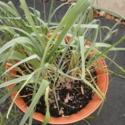It's hard to know if the author is talking about temporary freezing or long term, so I don't know if what I have to say is relevant. If watering is for the long term (winter), then I have some important points:
--- One wouldn't want to water a container just before a freeze. (I am assuming we are talking about winter dormant plants.) Plant hydration in cold weather takes a whole lot longer than in the summer or at room temperature. Not only is this because of the temperature itself, but most plants that go dormant in winter also slow their inherent ability to take up water. Watering the evening prior to a freeze would more likely detrimental than advantageous. Water uptake by the plant would be negligible in, say, six hours, and excess water in the soil wouldn't have time to drain thoroughly. If the soil in the container freezes, this frozen excess water is likely to damage roots as it quickly expands, not to mention cracking the container if it is vulnerable.
Better to water containers a couple days before a predicted freeze. Remember, if it is cold out, plants don't use much water, either. If we are talking about plants in the ground, then it doesn't matter. The ground won't freeze abruptly so as to cause such problems.
--- For marginally cold hardy herbaceous materials, the advice to water does not apply. Marginally cold hardy plants are marginal because they have difficulty attaining sufficient cold hardiness. Usually, it is because these plants don't begin the transition from summer growth to winter hardening early enough, and/or don't attain enough freeze resistance in time for the cold weather. Watering can help prolong the summer phase and delay the transition. Withholding water, or at least withholding extra water usually helps begin the hardening phase.
In addition, slightly withered root structures tend to survive colder temperatures better than fully turgid ones. (Remember, an herbaceous plant has no leaves to support.) Less water within the plant itself means soluble compounds are more concentrated in the plant's sap. The more concentrated an aqueous solution, the lower the freezing point. Thus, the plant has more cold hardiness. In fact, this is a major mechanism used by nearly all plants to resist freezing. Naturally moving water out of vulnerable plant tissues leaves a higher ratio of non-water compounds to water. This results in a solution that resists freezing better.
A good analogy is salting your ice covered driveway. You are creating a water and salt solution that has a lower freezing point,(= lower melting point). So the ice now melts at the same temperature where it was frozen before (and without the salt). But if the ice still doesn't melt, you put on more salt. This makes the solution more concentrated with salt (= a higher ratio of non-water compounds[salt] to water). The melting/freezing point lowers even more, and the ice melts.
--- The big push for watering winter dormant plants in the fall is for evergreens. For herbaceous and deciduous woody plants and barring a fall drought, watering more than normal shouldn't be necessary unless you're planting or transplanting.
